MND Lucy: 'I hope I don't lose my weird-ass laugh'
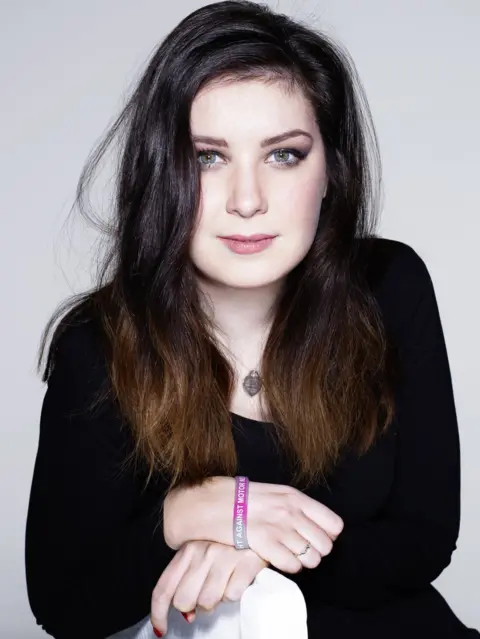 Rankin
RankinThere are plenty of things that make having Motor Neurone Disease (MND) "crappy" but losing the ability to speak and laugh would be too much, says Lucy Lintott.
The 22-year-old was diagnosed with MND three years ago, making her the youngest person in Scotland with the terminal disease.
MND, which usually affects people over 40, gradually makes gripping, walking, talking and swallowing extremely difficult - and eventually impossible.
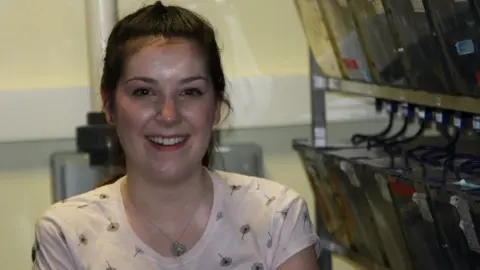 BBC Scotland
BBC ScotlandIt kills about a third of people within a year and more than half within two years.
Lucy tells the BBC Scotland documentary MND and the 22-year-old Me that it is like being "slowly paralysed".
As the condition progressively takes hold she worries that her "hilarious personality will slip away".
Over the past three years she has had to deal with using a wheelchair more as she can no longer walk unaided, but losing her voice holds new fears for the self-confessed "chatterbox".
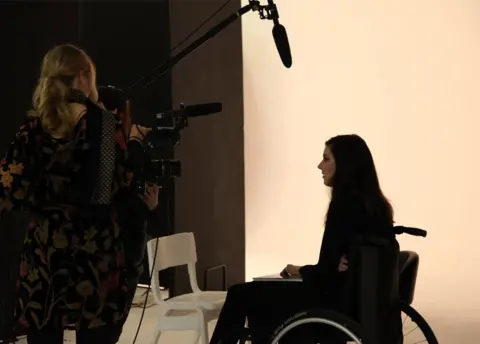 BBC Scotland
BBC Scotland"If I did lose my voice it would be the worst thing for me," she says.
"I could cope with everything else, just not losing my voice.
"I don't think I'd be able to handle that because most people know me for my weird-ass laugh."
Lucy, from Garmouth in Moray, first started experiencing difficulties with her balance and co-ordination at a summer camp in the US.
Her friends say she kept falling down and was slurring her words.
When she returned home she had a strange limp and was referred to a neurologist, who eventually diagnosed MND.
Bucket list
Lucy's father Robert says: "He just started talking matter-of-fact saying 'it's a terminal illness, no cure, you've got about three years to live'."
MND, also known as amyotrophic lateral sclerosis (ALS), occurs when specialist nerve cells in the brain and spinal cord, called motor neurones, stop working properly.
It is a relatively rare disease, affecting up to 5,000 adults in the UK at any one time.
Lucy says: "I am the youngest [in Scotland] living with MND.
"So it's not as if I can ask a granny or grandpa how they have dealt with it, or a mother or father, because it's completely irrelevant.
"There was no-one my age who I could really talk to."
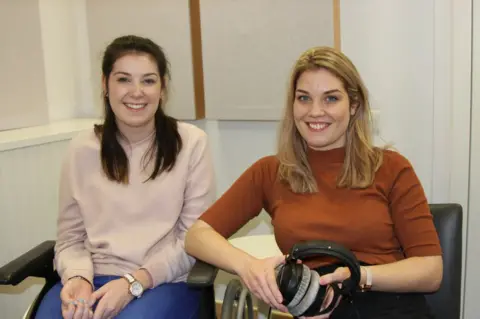 BBC Scotland
BBC ScotlandSo after her diagnosis, Lucy moved back from Glasgow, where she had been studying, and tried to make sense of her condition.
She wrote a bucket list of things she wanted to do, started publishing online blogs and began raising money to help the search for a cure for MND.
So far, she has raised more than £120,000, some of which is going into studying zebra fish at the Euan MacDonald Centre for MND research in Edinburgh.
"Unlike me this amazing little fish can rebuild its motor neurones even after its spinal cord has been damaged," she tells the documentary.
At the moment there is no known cure for the disease.
Lucy adds: "There is so little promise for people with MND. I've even heard it referred to as death sentence.
"I hate it when people say 'death sentence'. It gets me so mad."
Her mother Lydia says: "It is just acceptance that you cannot do anything about MND at the moment.
"It is just a waiting game to see how long we have got her for really, but hopefully they can find a cure or help that will be in time for Lucy."
 BBC Scotland
BBC ScotlandIn very rare cases, such as the cosmologist Stephen Hawking, people can live with the disease for decades.
He has famously spoken via a voice simulator for 30 years.
In preparation for the possibility that she might need similar technology, Lucy visited the voice bank in Edinburgh to record her speech.
However, due to the effect the disease has already had, the technicians sought to blend Lucy's voice with that of her older sister Laura.
"I genuinely don't think I'll get to that point where I'll need it," Lucy says.
"But if I am wrong I'll still have my voice to use and mum and dad will still have to listen to me."
Despite travelling the world ticking off items on her list and raising thousands for charity, Lucy admits that it has become very tiring and she no longer goes out very much.
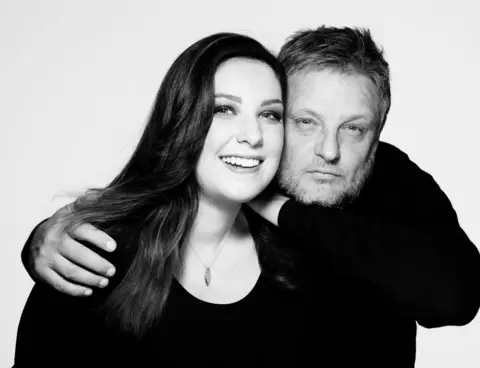 Rankin
RankinA visit to renowned portrait photographer Rankin at his London studio brought home to her how much MND had changed her life.
Paisley-born Rankin, who has photographed celebrities from Madonna and Kate Moss to the Queen, has also created many images showing the "defiance, strength and vitality" of people with terminal illnesses.
He tells the documentary: "Obviously I am dealing with a really young girl who is facing something that she should not be facing."
'Two different people'
Viewing the images created by the photographer is an emotional moment for Lucy, reminding her of her old self before the illness.
Rankin says: "It is a very revealing, a very tough thing to do, because she is looking at a photograph and she can see what she could be."
Lucy says: "When I saw the photographs I cried because it was like me before I was diagnosed - before my life really changed.
"In that moment I realised that up until that moment I'd seen myself as two different people.
"There was the Lucy Lintott who was adventurous, fun-loving, crazy and clumsy - I suppose the more perfect one of the two.
"Then MND Lucy who is terminally ill and needs people to live really.
"It just overwhelmed me that I was still the Lucy of before.
"It allowed me to mould myself back together and realise I'm still the same person and that only parts of me have changed."
